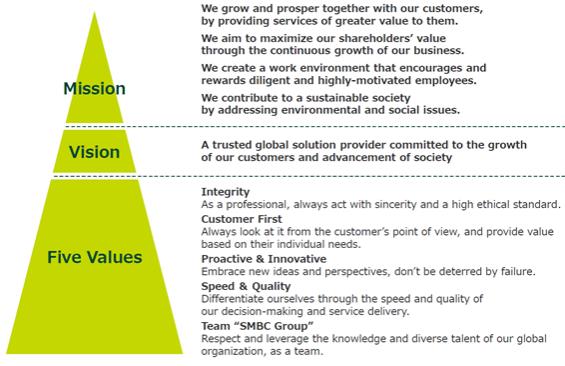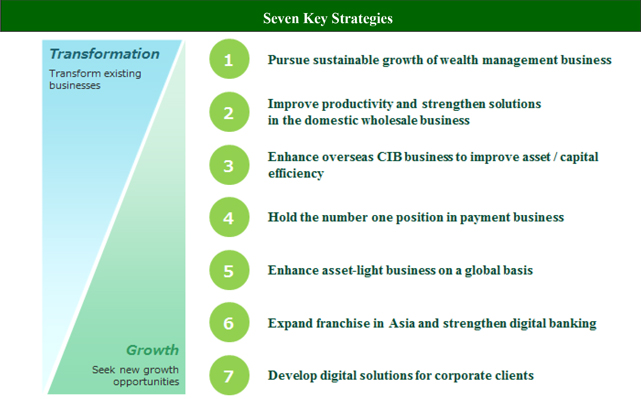(Documents Attached to the Notice of Convocation of the Ordinary General Meeting of Shareholders)
Business Report for the 18th Fiscal Year
(April 1, 2019 to March 31, 2020)
1. Matters Regarding the Current Condition of the Company
| (1) | Business Progress and Results of the Group |
Economic and Financial Environment
During fiscal 2019 (fiscal year ended March 31, 2020), despite signs of a slowdown in the global economy mainly in Western developed countries and China as prolonged trade friction between the U.S. and China became a major obstacle to international trade and corporate capital investment, moderate growth continued overall up until the latter half of the year. However, since the start of the year, economic activity has been severely restricted due to the worldwide spread of the 2019 novel coronavirus disease(COVID-19). On the whole, up until the end of February, the Japanese economy continued its gradual recovery as the employment environment continued to improve and personal consumption remained firm. However, by the end of the fiscal year, the economy became increasingly sluggish due to factors such as the self-restraint of sales activities aimed at preventing the spread ofCOVID-19.
In the Japanese financial and capital markets, short-term interest rates reached around minus 0.05%, led by the Bank of Japan (BOJ)’s Quantitative and Qualitative Monetary Easing with Yield Curve Control. While long-term interest rates temporarily rose to the 0.1% range in March of this year due to increased demand for funding as a result of the spread ofCOVID-19, they subsequently fell to around 0%. The exchange rate mainly moved in the range of 105 yen to 110 yen to the U.S. dollar. While the Japanese yen temporarily appreciated to the 101 yen range to the U.S. dollar in March of this year due to the spread ofCOVID-19 in the U.S. and the sharp drop in crude oil prices, by the end of the fiscal year it was around 107 yen to the U.S. dollar. The Nikkei Stock Average rose to the 24,000 yen range in January 2020 after continuing to move back and forth around the 21,000 yen range in the first half of the fiscal year. However, it remained around 19,000 yen toward the end of fiscal 2019 due to growing concerns over the deterioration of corporate business performance resulting from the lasting effects ofCOVID-19.
Regarding financial-related laws and regulations, the “Act on Partial Amendments of Payment Services Act, etc., to Address the Diversification of Financial Transactions based on Advances in Information Technology” was passed in May 2019. The act establishes regulations for transactions using crypto assets and adds the service of providing customer information to third parties as a business of financial institutions. In addition, in March 2020, the Group of Central Bank Governors and Heads of Supervision, which oversees the Basel Committee on Banking Supervision, announced that it has deferred the implementation timeline of the outstanding Basel III standards finalized in each country by one year, resulting from the impact of the spread ofCOVID-19.
Business Progress and Results
Under these economic and financial circumstances, Sumitomo Mitsui Financial Group, Inc. (hereinafter, “the Company”) and its subsidiaries (hereinafter, collectively with the Company, “the Group”), conducting mainly commercial banking and other financial services, including leasing, securities, and consumer finance, have worked to implement our Medium-Term Management Plan for the three fiscal years from fiscal 2017 to fiscal 2019, aimed at achieving the following vision: “We will become a global financial group that, by earning the highest trust of our customers, leads the growth of Japan and the Asian region.”
During fiscal 2019, the last year of the Medium-Term Management Plan, we set the basic policy as “Realize a strong finish to the final year of the current Medium-Term Management Plan and undertake initiatives that will deliver sustainable growth, with a view to the next Medium-Term Management Plan” and carried out various initiatives based on the three core policies below to become the financial group of choice for our customers.
|
Core Policies (1) Disciplined business management (2) Focus on our strengths to generate growth (3) Integration across the Group and globally to achieve sustainable growth |
1


